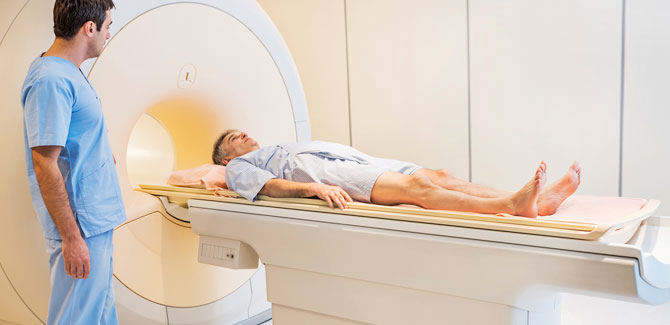
At Marshall Medical, pulmonary and oncology specialists work together to facilitate early diagnosis and expedited care for lung nodules.
If you have been referred with what is commonly called a “spot on the lung,” the Pulmonary Nodule Team formulates an individualized diagnostic and treatment plan using the latest technologies and a multidisciplinary approach.
Determining whether a lung nodule is benign or malignant is an important first step in achieving the best possible outcome. Prompt scanning, diagnosis and treatment of lung cancer, which can initially present as a lung nodule, may be the best chance for curing cancer. At Marshall Pulmonary Nodule Clinic, a multidisciplinary team of experts in pulmonary medicine and oncology provides early diagnosis and expedited care for lung nodules.
If you have been diagnosed with a lung nodule, commonly called a "spot on the lung," your doctor can refer you to the Clinic. Within 72 business hours, you will meet with one or more of our specialists in an office setting to review your scans.
What are Lung Nodules?
Lung nodules – small masses of tissue in the lung – are common. They appear as round, white shadows on a chest x-ray or computerized tomography (CT) scan.
Often these nodules cause no symptoms and therefore go undetected. The majority of nodules are found through testing performed for other reasons, such as x-rays or CT scans for pneumonia or abdominal pain. While 80% of pulmonary nodules are found to be benign and can come from an infection or scar tissue from old infection, some are early signs of lung cancer and require prompt evaluation.
Non-cancerous lung nodules usually require no treatment. Your doctor may recommend periodic imaging tests to see if a lung nodule grows or changes over time.
If a lung nodule is new or has changed in size, shape or appearance, your doctor may recommend further testing to determine if it is cancerous. Testing could include:
- Bronchoscopy - a procedure used to see the inside of the airways and lungs.
- Tissue biopsy - a procedure to remove a piece of tissue or a sample of cells to be analyzed in a laboratory.
- Low dose CT scan - special x-ray tests that produce cross-sectional images of the body.
- CT guided biopsy - uses real-time CT images to ensure biopsy samples are accurately taken from the desired part of the lung.
- PET scan - an imaging test that assists in the diagnosis of cancerous lesions.
- Endobronchial ultrasound or EBUS - a technique to obtain tissue or fluid samples from the lungs and surrounding lymph nodes without conventional surgery.
Medicare will now cover lung cancer screening with Low Dose CT once per year for Medicare beneficiaries who meet all of the following criteria:
- Age 55-77, and are either current smokers or have quit smoking within the last 15 years;
- Have a tobacco smoking history of at least 30 “pack years” (an average of one pack a day for 30 years);
- Receive a written order from a physician or qualified non-physician practitioner that meets certain requirements.
Medicare coverage includes a visit for counseling and shared decision-making on the benefits and risks of lung cancer screening. Other insurances besides Medicare also cover lung cancer screening. Please ask your doctor if lung cancer screening is appropriate for you.




